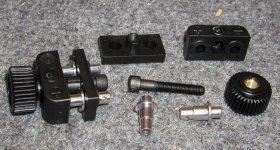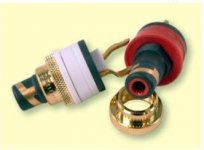IMO, Cardas patented posts are probably one of the better posts available presently. They might not look the best, and only work with spades, but certain properties are hard to match by other designs.
I'm not sure if that qualifies for completely insulated, but I suspect North American regulations are not as strict in that matter as European.
Jeff Rowland is using them extensively.
I'm not sure if that qualifies for completely insulated, but I suspect North American regulations are not as strict in that matter as European.
Jeff Rowland is using them extensively.
An externally hosted image should be here but it was not working when we last tested it.
To Peter : " ... you take away fun ... " - how do you mean this ? And wrong direction ? Here you have thruth, 'cos here is showed " instead solutions " of output terminals - cheap trash. High quality ones are made for industry or military using, but have one disadvantage : they are not cheap. Industry binding posts are different to " pseudohighend " and some manufacturers are using this - look for example at ML, Krell or Burmester, where you can see it. By the way, how do you recognize realy high quality binding post ?
Upupa Epops said:By the way, how do you recognize realy high quality binding post ?
In binding posts, I like the minimum amount of metal, good contact area and no force on conducting parts.
Cardas patented posts provide all that. All other posts look only fancy by comparison.
Mr Evil said:And they make a very satisfying *click*
Talking about *click* (sorry, OT), I found some very nice mini XLR plugs (chassis mount male and cable female), that make a very good PSU connection for preamps, phono stages, Dacs, etc.
They also make a very positive click.
Like these ones:
http://www.cybermarket.co.uk/ishop/923/shopscr2031.html
Small and beautiful.
Upupa Epops said:To Peter : How you can to get good contact with minimum amount of metal and no force on conducting parts ? Look at binding post for welding machine - they are robust, big and have fine turns with small tolerances ( not such as brass high end trash ones ).
I said a minimum amount of metal, I didn't say in contact area. As you look closely at Cardas patented posts, you'll notice that all metal they use is actually only in the contact area, nothing else. Also, those metal parts are not affected by pulling/stretching forces (from a nut) as the nut only proveds pressure to bring both contact areas close together, but none of the conducting elements is affected by the pulling force (as it's usually the case with other designs).
Of course those posts are not good for welding machines, but for average power amps they are more than enough.
Attachments
Peter Daniel said:That's what I was actually curious about: are those patented posts OK with strict European regulations, where no exposed parts of posts to be present?
Maby more OK than welding machine binding posts.

Are we gonna use car battery terminals on audio amps?

Let's talk about audio.
I sure prefer Neutrik RCA plugs than some heavy-metal "high-end" ones that populate around.
Kimber RCA plugs are good too.
But some people buy what looks impressive, substantial, like a Buick.

carlosfm said:
Talking about *click* (sorry, OT), I found some very nice mini XLR plugs (chassis mount male and cable female), that make a very good PSU connection for preamps, phono stages, Dacs, etc.
They also make a very positive click.
Like these ones:
http://www.cybermarket.co.uk/ishop/923/shopscr2031.html
Small and beautiful.
They certainly are small and beautiful, but not so good for hi-end audio applications.
All the connectors in my Lectrosonics radio microphones use mini-XLR types, which are better than others (Lemo) but not as good as they could be. Dealing with them for more than 10 years, let me tell you that they are really a pain.
1) Materials used are not that good. No teflon dielectric, no silver or gold plate on contacts. It's all nickel-plated brass.
2) Construction puts the terminals quite close to each other, which makes soldering quite difficult.
3) You can only use thin cables with them, as the cable clamp is small. Very much like 1/8"jacks.
4) The unlock button sometimes does not unlock the connector as it should.
As I said: in my application is fine, because it improves on the Lemo and 1/8" connectors. But if you have space, which we usually have, and want a good locking connector, use a regular XLR. For the money there's no better locking connector.
Carlos
Peter Daniel said:I really like the new WBT "Next Gen" RCA jacks. They also have matching plugs:
Yes, that's sort of a copy of the original Bullet plug concept.
carlmart said:
They certainly are small and beautiful, but not so good for hi-end audio applications.
All the connectors in my Lectrosonics radio microphones use mini-XLR types, which are better than others (Lemo) but not as good as they could be. Dealing with them for more than 10 years, let me tell you that they are really a pain.
1) Materials used are not that good. No teflon dielectric, no silver or gold plate on contacts. It's all nickel-plated brass.
2) Construction puts the terminals quite close to each other, which makes soldering quite difficult.
3) You can only use thin cables with them, as the cable clamp is small. Very much like 1/8"jacks.
4) The unlock button sometimes does not unlock the connector as it should.
As I said: in my application is fine, because it improves on the Lemo and 1/8" connectors. But if you have space, which we usually have, and want a good locking connector, use a regular XLR. For the money there's no better locking connector.
Carlos
They are new and they work well.

Thanks for the input, Carlos.
I was searching for a small plug (smaller than XRL or even DIN) for low-current power connections.
Not much options than making a bigh hole on a small box, like my phono pre.

carlosfm said:
Yes, that's sort of a copy of the original Bullet plug concept.
Yes, it may be the beginning of a new trend. Many people complained that RCA design is not the best and this is similar to what 47Labs came up with as well as Eichmann.
Some people do their own, home made version, right Thomas?
carlosfm said:
They are new and they work well.
Thanks for the input, Carlos.
I was searching for a small plug (smaller than XRL or even DIN) for low-current power connections.
Not much options than making a bigh hole on a small box, like my phono pre.
Well, they are not new. Shure has been using 3-pin versions on their portable mixers since the mid '90s, to link one mixer to another.
The 5-pin version I got to know in 1990, with my first radio mike.
These connectors are not popular in audio, and my guess is because somebody tried them and found not much use in it.
There's a high quality pro-connector, made by HRS, which is also small. Type is HR10-7P. The simplest is 4 pin, with cable and panel versions. Pins are gold plated and it locks. It's not cheap, but it's very reliable.
PREH DIN connectors are also good and lock. This used to be popular in the UK.
In any case do try the mini-XLR to see if it solves your problems.
Carlos
The mini XLR's are called TA4 or TA3 depending on the number of pins. Add an F to the end for the female versions. They are used by many manufactures, crown and shure use them on various wired mics and shure and vega use them on thier wireless transmitters. Neutrik has some small, albeit exotic connectors the Turbosound uses for drive interconnects on thier amp racks. I think Jason sound out of canada also uses them.
carlmart said:There's a high quality pro-connector, made by HRS, which is also small. Type is HR10-7P. The simplest is 4 pin, with cable and panel versions. Pins are gold plated and it locks. It's not cheap, but it's very reliable.
Yeah, those HR10s are pretty cool. Played around with those a long time ago. Very small.
Though I've found I prefer plastic shell connectors to metal shell types. My current favorite is still the Redels which not only sound fantastic (to me anyway) but they have so many available options.
You can get them with five different keying options so you can use the same basic connector for multiple uses without worrying about plugging a power feed into a line input. You can get them with crimp or solder contacts as well as straight and right angle PC mount. And you can mount them from either the front or the rear of the panel.
se
carlmart said:Well, they are not new. Shure has been using 3-pin versions on their portable mixers since the mid '90s, to link one mixer to another.
Carlos, when I said they are new and work well, just meant that I bought them two weeks ago.
Maby that's why they still work fine, because they are new.
The locking thing works fine, but I agree with you, I don't feel that this plug (the female) is robust for repeated use.
- Status
- This old topic is closed. If you want to reopen this topic, contact a moderator using the "Report Post" button.
- Home
- Amplifiers
- Chip Amps
- Gainclone Connectors (split from electrical safety)

 and you have sure thruth, that contact are only pushed, not screwed, but change welder contacts again and again after welding ?
and you have sure thruth, that contact are only pushed, not screwed, but change welder contacts again and again after welding ? 